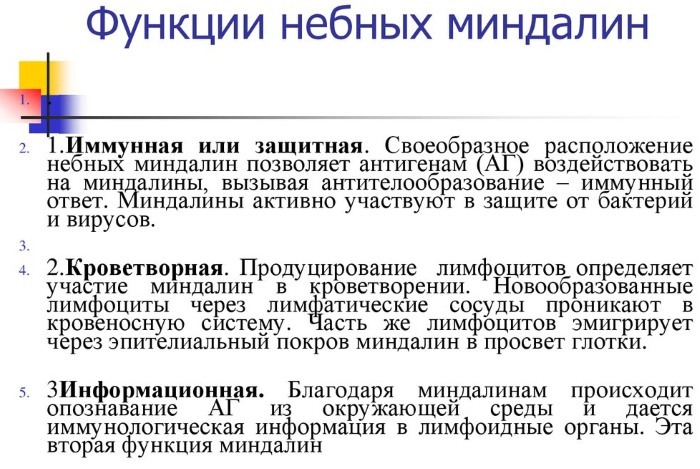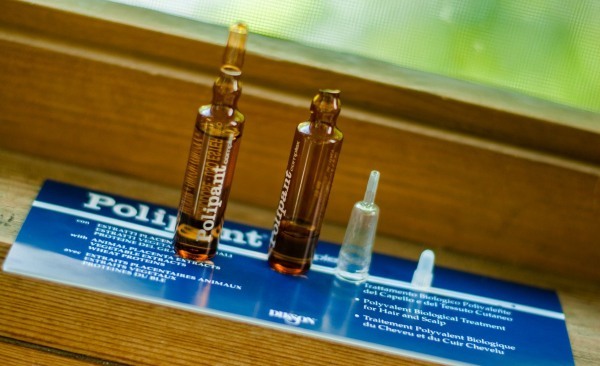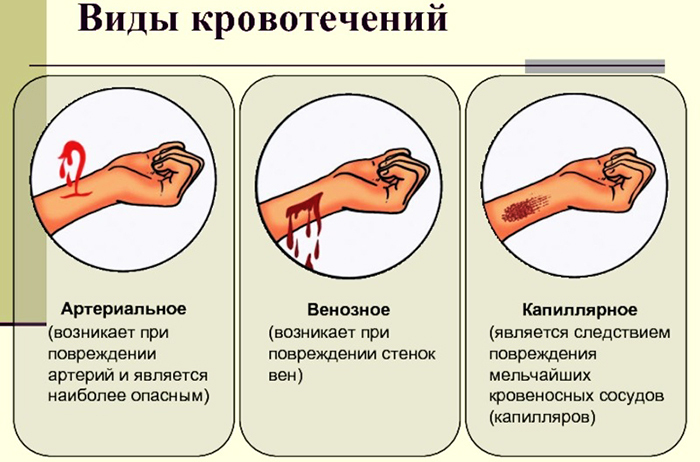Content
- Can pregnant women take remedies for toothache?
- What is the danger of pain relievers during pregnancy?
- Features of the treatment of toothache in pregnant women
- Rules for the use of pain medications
- What painkillers are used in the early stages?
- Pills
- Dental drops
- Gel
- Toothache in later stages
- Folk remedies for relieving toothache
- Soda solution
- Herbal decoction
- Video about dental treatment during pregnancy
Most medicines are contraindicated during pregnancy. Many analgesic medications have teratogenic activity, increase uterine tone, and increase blood pressure. If a tooth hurts during the gestational period, regardless of the trimester, you should carefully choose the medicine.
With development in the dental cavity, pulp or surrounding tissues of the jaw structure the infectious and inflammatory process, the secretion of prostaglandins is activated - lipid enzymes that irritate pain receptors.
Analgesic drugs inhibit the release of signaling biochemical compounds. This action leads to the relief of painful sensations. Medicines in this pharmaceutical category have numerous side effects.
A toothache during pregnancy (1-2-3 trimester) is often due to an inflammatory process or infection of the oral cavity. Chemical compounds contained in most analgesics harm the female body and the embryo developing in the womb.
When choosing a safe and effective medication during the gestational period, take into account:
- gestational age;
- body weight of a woman;
- individual portability;
- the presence of chronic diseases, especially hypo- or hypertension, diabetes mellitus, heart dysfunction, renal failure;
- the current physiological state of the body.
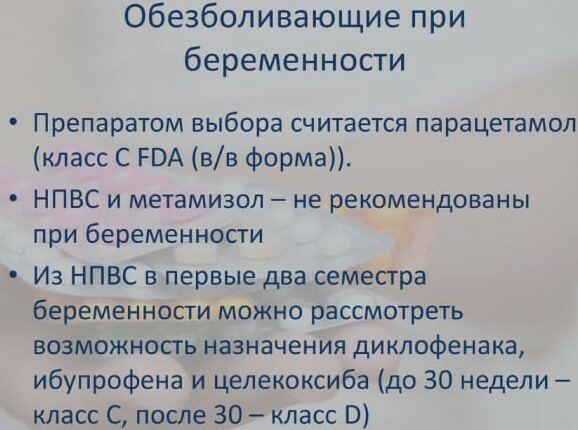
There are pain relievers that are approved for use during pregnancy. Such medicines do not have teratogenic properties, contain exclusively hypoallergenic herbal ingredients.
Ibuprofen, indicated for use at any gestational age, is considered an analgesic with an established safety profile for pregnant women.
Anesthetic medicines have been developed for women carrying a child in the form of dental drops and surface gels, components that have a local effect and do not cross the placental barrier.
During the gestational period, you can use traditional medicine, all kinds of home recipes, decoctions of medicinal herbs. Before using any substance with analgesic properties, be sure to consult with a gynecologist and dentist.
What is the danger of pain relievers during pregnancy?
Classic medicines of this pharmaceutical category are distinguished by their low molecular weight, which allows their components to cross the placental barrier. Upon penetration into the structure of the gastrointestinal tract, the active substance of the analgesic drug disintegrates into microparticles.
This is necessary by blocking pain receptors. In the course of metabolism, the active and auxiliary components are transformed into physiologically active compounds.
Exposure to generated chemicals results in:
- Violation of intrauterine development. The toxic effect damaging the embryo is called teratogenic effect.
- Differences in blood pressure in the female body. Such an effect causes hemodynamic disturbances in the developing body of the child, since the circulatory systems of the woman and the fetus are paired.
- Renal and hepatobiliary dysfunctions. The tissues of the parenchymal organs are highly susceptible to toxic effects.
- Fluid retention. As a result, edema appears, preeclampsia develops - a severe complication of pregnancy, characterized by ptyalism, fatty degeneration of the liver tissues, tetany, gestational dermatosis.
- Digestive disorders. Among them are gastritis, duodenitis, intestinal perforation, erosion, stomach ulcer.
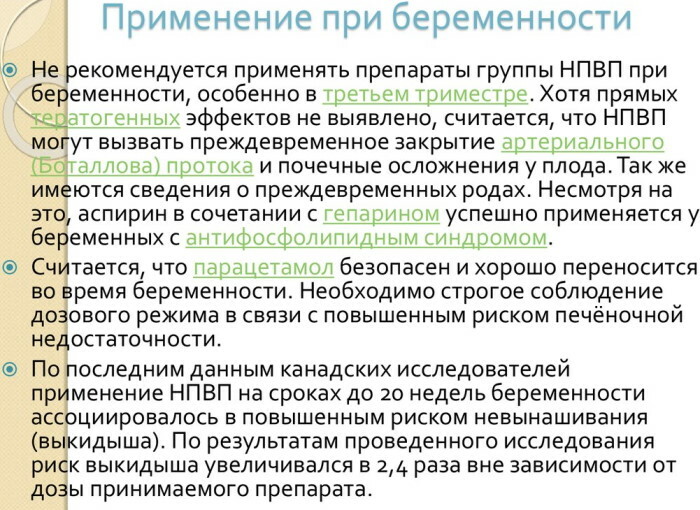
Analgin is especially dangerous during gestation. Frequent relief of dentalgia with this drug irreversibly changes the blood formula, including the embryo. Dysfunctions of the kidneys and liver are possible.
Other drugs prohibited during the period of bearing a child are presented in the table:
| Medication | Reason for contraindications |
| Baralgin | It has a nephrotoxic effect. |
| Spazmalgon | Violates cerebral circulation, damages liver cells. |
| Ointments containing snake or bee venom | They provoke allergic reactions, interfere with the normal formation of the musculoskeletal system of the fetus. |
| External gels based on Dimexide | Negatively affect the cardiac activity of the mother and child. |
| Products containing essential oils | They can cause spontaneous abortion (miscarriage). |
During the gestational period, it is necessary to avoid the use of combined drugs containing tetracycline antibiotics. In the later stages of bearing a child, it is better to refrain from using Advil, a non-steroidal anti-inflammatory drug.
Features of the treatment of toothache in pregnant women
Analgesic medications are symptomatic without affecting the cause of the syndrome. To achieve a sustainable clinical it is necessary to visit a dental office.
A toothache during pregnancy (the first trimester is distinguished by the largest number of contraindications for taking medications) is often due to progressive caries or pulpitis. For short-term relief of paroxysmal syndrome, acetaminophen or clindamycin can be used.
Dental treatments are not contraindicated. The nature of the effect of anesthetics or other therapeutic agents used in office manipulations is taken into account.

Urgent dental interventions are subject to:
- caries - a sluggish pathological process of destruction of dental tissues, provoking periodic acute pain;
- pulpitis - inflammatory lesion of the neurovascular bundle, characterized by spontaneous aching or severe pulsating paroxysms;
- periodontitis - an inflamed condition of the biological fibers surrounding the dental root;
- stomatitis - an immunogenic disease of the oral mucosa;
- gingivitis - inflammation of soft tissues, which does not violate the morphological structure and integrity of the periodontal junction;
- periostitis - inflammatory lesion of the jaw periosteum.
Urgent dental care and the use of anesthetics are required for traumatic damage to units of the jaw row, chipped apex, fractures of the dental root. Such orthopedic disorders are characterized by acute, difficult-to-tolerate pain syndrome.
Sanitation of the oral cavity with medications is carried out in case of infection - glossitis, cheilitis, abscesses. For safe anesthesia, local anesthetics are used - Ultracaine, Scandomest.
Erythromycin, Penicillin are considered safe, actively used antibiotics during pregnancy. To suppress fungal and bacterial infections in women carrying a child, dentists use Metronidazole.
Rules for the use of pain medications
Analgesics for pregnant women are a short list of pain relievers with no known fetal toxicity. Even when taking an approved drug, you must first consult a gynecologist and dentist.
The US Department of Health's Food and Drug Administration (FDA) has categorized pharmaceuticals into 5 categories according to the level of hazard to the fetus.
These guidelines are usually followed by doctors in all countries. In addition to relieving pain, during pregnancy, dental procedures are strictly regulated. The doctor determines the volume and composition of the drugs used individually, taking into account the gestational age, individual tolerance.
Therapeutic or surgical intervention is performed only in an emergency, acute infectious lesions and other pathological manifestations that can harm a child or complicate childbirth. Due to the peculiarities of the metabolism of the pregnant woman, an increased dose of the drug may be required for pain relief.
A woman's fundamental refusal to use analgesics, anti-inflammatory or antibacterial agents can cause more serious consequences than taking drugs. During some periods of gestation, the use of any medication should be limited as much as possible.
A stressful condition provoked by pain syndrome, violation of physiological parameters can lead to miscarriage. If paroxysms in the oral cavity are caused by an infectious, inflammatory or purulent-septic process, the production of cytokines and interleukins is triggered in the lesion.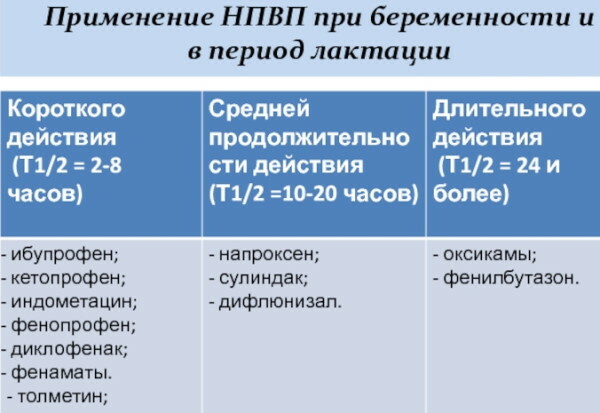
During pregnancy, such physiologically active substances provoke violations of embryonic development. A toothache is often due to exposure to pathogenic microflora. The bacteria produce toxic compounds that poison the fetus. Their influence is especially dangerous in the first trimester, when the vital organs of the child are being formed.
What painkillers are used in the early stages?
At 1-13 weeks of gestation, physiologically active substances or their metabolites contained in drugs can disrupt the development of the embryo. It is better to refrain from taking any medications. But toothache cannot be tolerated either.
Cider triggers the release of a shock dose of adrenaline into the bloodstream, which increases the likelihood of bleeding and can lead to miscarriage. Dental infections that cause pain combined with inflammation enter the fetal bloodstream, causing irreversible structural changes.
In the first 12 weeks of gestation, the blood-placental barrier is in the process of forming. During this period, synthetic-based analgesic drugs with embryotoxic properties are especially dangerous.
The first trimester is a critical phase of the child's development, characterized by a bookmark:
- internal organs;
- sensory apparatus;
- nervous system;
- skeletal structures;
- muscle fibers;
- brain and spinal cord.
To relieve toothache in early pregnancy, you can use safe folk recipes after consulting a gynecologist and dentist. The following are approved pharmaceutical analgesics at 1-13 weeks of gestation.
Pills
The non-steroidal anti-inflammatory drug Nurofen has a pronounced analgesic effect and has a high safety profile for the fetus. The tablets suppress the symptoms of chronic pulpitis, carious manifestations.
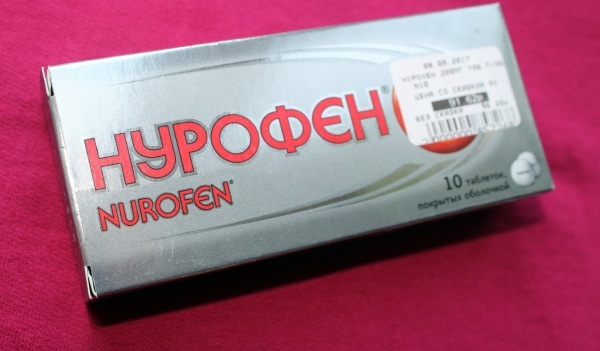
Nurofen is effective for inflammation of the gum tissue, ligamentous apparatus of the jaw structure. Each tablet contains 200 mg of the active ingredient, ibuprofen. In the first trimester of gestation, it is allowed to take a maximum of 3 units of medicine per day.
The drug contains propionic acid, which irritates the stomach and intestinal walls. It is undesirable to take Nurofen to pregnant women with dyspeptic symptoms, severe toxicosis, periodic bouts of heartburn.
Dental drops
Such products are designed on a natural plant basis.
Drops recommended for early pregnancy contain:
- camphor oil;
- peppermint;
- valerian extract;
- extract of St. John's wort;
- pharmacy chamomile.
The combined composition is distinguished by analgesic, bactericidal, anti-inflammatory properties. In the early stages of pregnancy, a cotton swab moistened with a liquid solution is installed into the cavity of a decayed tooth or pressed against the inflamed gum for 5-10 minutes.
The remedy temporarily reduces the severity of the pain syndrome, but does not affect the cause of the paroxysm. When using dental drops, you need to take precautions.
The ingress of funds into the esophageal canal can activate the gag reflex, provoke burn damage to the mucous membranes of internal organs. Dental drops with antiseptic and analgesic properties are effective for pain caused by caries.
Pathogenic microorganisms living in the pathological focus increase the risk of postpartum hemorrhage, form allergic reactions in a child, can cause severe intrauterine disorders development.
Gel
From this pharmaceutical group in the early stages of pregnancy, Camident is approved - a combined preparation for external use, intended for the rehabilitation of the dental cavity.
The anesthetic gel contains:
- lidocaine;
- medicinal chamomile;
- thymol.
The drug increases the nonspecific resistance of the female body, eliminates pathogenic microflora, and eliminates the inflammatory process. Local anesthetic gel Camident improves the respiration of the epithelial lining of the oral cavity.
The medicine is installed on the root area of the affected tooth or applied to the surface of the inflamed gums. Camident is effective for stomatitis, gingivitis, periodontal disease.
Toothache in later stages
The third trimester is characterized by the active growth of the fetus, the physiological preparation of the female body for childbirth. Analgesic drugs in late gestation can provoke excretory and cardiovascular dysfunctions.
A toothache during pregnancy (III trimester requires a careful attitude to taking any medications) often hormonal reasons - preparing the body for childbirth exacerbates chronic diseases, including dental ones.
The method of relief of the syndrome is determined according to the principle of minimal nephrotic and hepatobiliary toxicity.
At 15-38 weeks of gestation, the following are recommended for use:
- Paracetamol. The tablets have analgesic, antipyretic, antipyretic properties. In small doses, Paracetamol has no nephro- and hepatotoxicity. In late pregnancy, it is allowed to take no more than 2 tablets per day.
-
Efferalgan. Anesthetic drug of central action on a combined basis. Pharmacological properties are similar to Paracetamol. They will differ from it in auxiliary components.
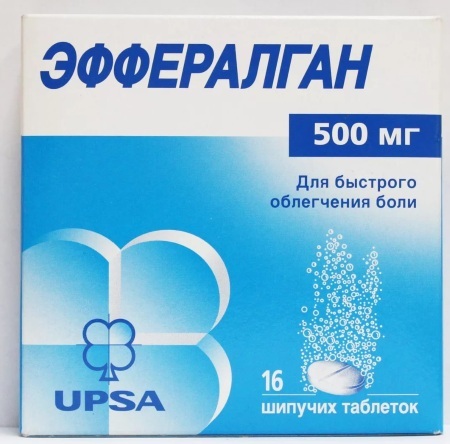
- Panadol. Safe tablets without teratogenic activity, do not irritate the gastrointestinal walls. It is forbidden to combine with other drugs based on paracetamol.
- Aspirin. The active substance temporarily suppresses pain reactions in the focus of inflammation. Aspirin is prescribed for pregnant women with exacerbation of pulpitis or periodontitis.
Articaine-based anesthetics are used. Allowed in the III trimester No-shpa or its analogue Drotaverin. The maximum daily dosage is 6 tablets. Acute paroxysm of pills is not able to stop.
Folk remedies for relieving toothache
Unconventional prescriptions are considered safer than pharmaceuticals. Folk remedies do not give a persistent stopping effect, alleviating the condition of the pregnant woman for a short time.
A simple and affordable way to suppress pain reactions in the oral cavity at home is an external installation of melted propolis or the use of warm compresses with sea buckthorn oil.
Rinsing with tincture of chamomile, sage or St. John's wort helps. A cotton swab is moistened with such folk remedies for targeting a painful focus, applying it to an inflamed area of the gingival surface or a tooth destroyed by caries.
Non-traditional recipes are used only in the absence of an allergic reaction to the herbal ingredients contained in them.
The analgesic effect is possessed by:
- clove powder;
- yarrow;
- succession;
- calendula;
- plantain leaves;
- celandine;
- aloe extract;
- Kalanchoe juice.
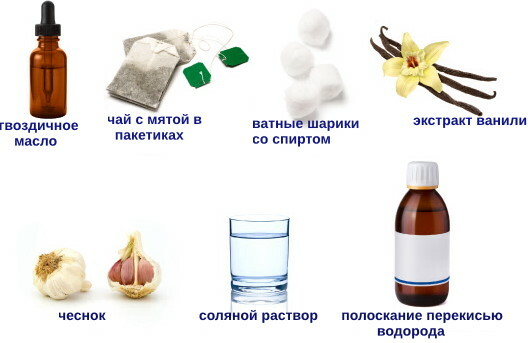
Decoctions for gargling or compresses are prepared from these ingredients. During pregnancy, it is undesirable to take such funds inside. Clove powder contains aromatic oils with antiseptic properties.
A toothache during pregnancy (trimester I, II or III does not matter) is often due to the effects of pathogenic microflora. Aromatic oils of clove powder eliminate microorganisms that cause paroxysmal manifestations in the dental cavity.
Soda solution
The product is used for rinsing.
A weakly concentrated solution of sodium bicarbonate has a complex healing effect:
- inhibits the vital activity of pathogenic microbes;
- reduces the severity of the inflammatory process;
- reduces the susceptibility of dental nerves to irritation;
- removes plaque, which serves as a breeding ground for bacteria.
The product does not cause allergic reactions, it is absolutely safe for a child in the womb, does not affect the internal organs of a woman if accidentally swallowed.
To prepare a rinsing solution for 250 ml of boiled and hot drinking water, dilute 1 tsp. l. baking soda. To enhance the disinfecting effect, add 15 g of table salt. Mix the ingredients thoroughly.
The product is cooled to a comfortable temperature. Too hot liquid will become an additional irritating factor for dental nerves, provoke suppuration. The oral cavity is rinsed with soda solution 6-8 times a day.
Herbal decoction
Such formulations are used for rinsing, sighting external installation with a cotton pad, or taken orally. In the latter option, you can use herbal decoctions with mild sedative and sedative properties.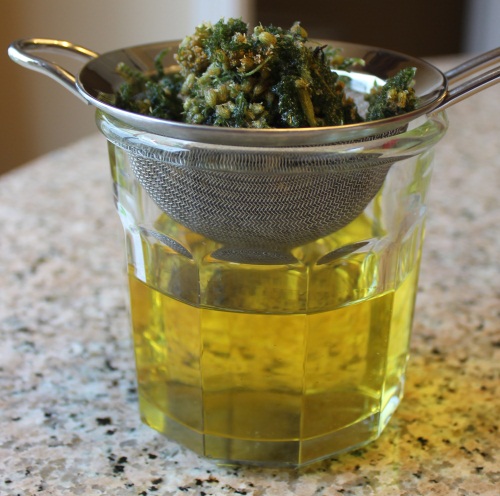
In case of toothache provoked by infectious inflammation, a mixture of sage and dried chamomile in a 1: 1 ratio is indicated for use. A therapeutic agent in a volume of 10-15 g is diluted with 500 ml of boiling water.
Mix thoroughly and insist in a glass or porcelain dish, wrapped in a terry towel and sealed with a lid. You can use a thermos.
Means:
- suppresses inflammatory reactions in the painful focus;
- inhibits pathogenic microflora;
- reduces irritation of nerve fibers and dental tissues;
- eliminates swelling of the gums.
The choice of the therapeutic composition during pregnancy depends on the cause of the paroxysm and the clinical picture. If a tooth hurts due to flux or abscess, the collection includes calendula, plantain, clove powder. The tool has an analgesic and regenerative effect. Herbal decoctions are used in any trimester of gestation.
Video about dental treatment during pregnancy
Dental treatment during pregnancy:

